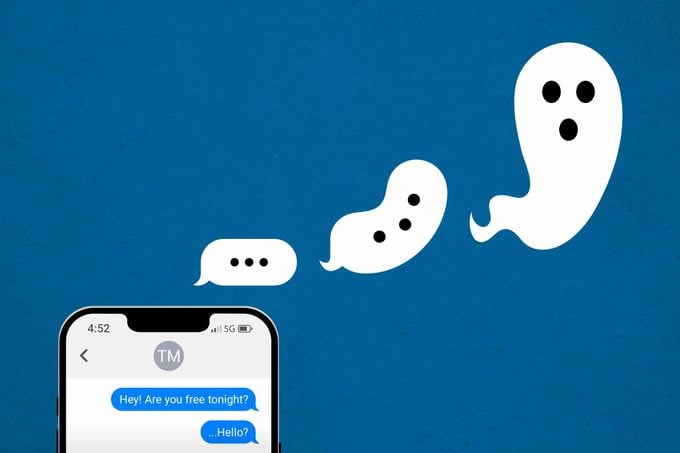What Is Ghosting—and Why Is It So Rude?
Simply stopping all communication with someone is poor etiquette. Here's how to avoid ghosting the people in your life—and what to do if you've been ghosted.
Best friends Sydney L. and Marie M., both 27, met in a church group and hung out or talked nearly every day for a year, sharing their innermost thoughts and feelings. And then one day, Marie says, “Sydney just stopped replying to my calls and messages with no warning or explanation at all. She ghosted me.” It’s an all-too-familiar experience, but what is ghosting, exactly? And more important, why is it so hurtful?
Ghosting—the practice of ending all communication with someone without giving an explanation—can happen in any type of relationship, including between romantic partners, friends, co-workers and family. And it’s more common than you may think. In a 2019 YouGov survey, one-third of U.S. adults confessed to doing it in an interpersonal relationship, while a 2021 Indeed survey found that 77% of job seekers reported being ghosted by a potential employer (and 18% of applicants confessed to doing the ghosting).
“Ghosting may be an incredibly common practice, but that doesn’t make it less rude or unkind,” says Jeff Temple, PhD, a licensed psychologist, professor and relationship researcher at the University of Texas Medical Branch. “It’s one of the most hurtful things you can do to another person.” In other words, ghosting isn’t just Gen Z slang for ditching a relationship; it’s also poor etiquette.
Marie agrees. Left feeling confused and heartbroken, she tried to follow up several times with Sydney, even a year after the ghosting happened. “I tried apologizing for anything I could think of, but nothing worked. I haven’t heard a word from her since,” she explains. “I’ve had to accept that I’ll never know why she decided to end our friendship. And I can honestly say that the pain of losing that deep friendship hurt worse than any romantic breakup I’ve been through. It took me a long time to get over the pain of that.”
Sound familiar? Ghosting is just as gutting in a romance—you’ve used your best Tinder pickup lines and pulled together some truly epic romantic date ideas only to have the other person simply stop responding. To help you deal with (and better understand) this common occurrence, we asked experts to explain everything you need to know about ghosting. Read on to find out their top tips.
Get Reader’s Digest’s Read Up newsletter for more etiquette tips, humor, cleaning, travel, tech and fun facts all week long.
What does ghosting mean?
Before you can really understand how ghosting might affect you, you need a grasp of the basics. So, what is ghosting? “Ghosting is exactly what it sounds like: It’s silently disappearing from someone’s life, like a ghost,” says Ramani Durvasula, PhD, an author, licensed clinical psychologist, professor of psychology at California State University–Los Angeles and expert in toxic relationships. “The person cuts off all communication, without warning or explanation.”
It’s not a new concept, though the word itself is relatively recent. It started appearing with this modern definition in the early 2000s, and Merriam-Webster added it to the dictionary in 2017.
Though the term ghosted is so ubiquitous that it became the title of an Apple TV+ movie (in which, of course, the leading man is ghosted by a woman he hooked up with), you may also encounter ghosting synonyms, including fadeaway and swerve. (It’s called an Irish exit if you choose to “ghost” and leave a party rather than saying goodbye.)
Ghosting is most common in dating—particularly dating online or through apps—but can also happen in any type of interpersonal or professional relationship, says Gabriela Reyes, LMFT, a licensed therapist in San Jose, California, and an expert in social media etiquette and relationships for the dating app Chispa.
Why do people ghost?
People ghost others for many reasons, Temple says: concern about hurting the other person, fear that they won’t be able to handle their own feelings, a desire to avoid the consequences of the break or to move on quickly, embarrassment or because it takes less time than talking. “Occasionally, someone will even unintentionally ghost because they are forgetful,” he adds.
But the most common reason people go incommunicado is simply because it’s easier than having a difficult conversation.
“Many people weren’t taught what healthy adult communication looks like in relationships, so they default to the easiest way out—ghosting,” Durvasula says. Basically, they never learned the etiquette for discussing potentially painful subjects, or they don’t know how to say no, so they just stop talking instead, she says.
What are the signs of ghosting?
Knowing what is ghosting and what is not can help you both make sense of the communication issues you’re encountering and avoid disappearing on others. The telltale sign that you’ve been ghosted is that the other person becomes totally unresponsive to any type of communication, Reyes says. Here’s what that may look like:
- Your texts are left on “read” (or aren’t opened at all).
- You can no longer see their social media profiles.
- You are blocked from messaging them on social media.
- They’ve disconnected from you on dating and/or social apps.
- They don’t answer your phone calls.
- They avoid you in person or find excuses to avoid places where you’ll be.
- They ask mutual friends to not tell you about them.
- They dodge invitations to meet up.
Ghosting often happens out of the blue, but sometimes you may see signs of other rude conversation habits, including a fadeaway before the total cessation of communication, Temple says. Signs that someone is fading away may include:
- They take days to respond to your texts or calls.
- They bail on plans with you at the last minute.
- They talk about only vague or superficial things with you.
- They don’t invite you out, text you or otherwise initiate communication.
- They employ “breadcrumbing” or give you just little bits of attention sporadically.
If you’re cringing while reading this, that’s because these things do hurt—even when coming from casual acquaintances or at work, Durvasula says. “We all have a very basic and beautiful need for human connection, and ghosting strikes at the core of that,” she says.
At best, being ghosted leaves you feeling confused, worried and frustrated. At worst, it makes you question your self-worth, leaving you with a lot of unanswered questions that can make you feel bad for a long time.
What should you do if you’ve been ghosted?
There isn’t a lot you can do to fix things if you’re the one being ghosted—after all, what is ghosting but a sudden end to a relationship without the opportunity to repair it? But our experts have some tips for dealing and healing.
Stop reaching out after three tries
You can try one to three times to reach out and see if there was a miscommunication, but if they still don’t reply, proper etiquette says you should respect their boundaries and unspoken desire for ceased communication—as painful and confusing as that may be, Temple says.
Don’t get others involved
Another common etiquette mistake Durvasula sees is the snubbed person using mutual friends or family as a go-between. “It’s tempting to ask a friend to talk to the ‘ghoster’ to get some answers, but it rarely works out positively,” she says. “More likely, it will make the situation worse and put the middle person in an awkward position.”
Vent to an uninvolved party
You shouldn’t talk to your “ghost” or complain (even politely!) to mutual connections. But you can and should vent about the problem to a good friend or family member who can provide support and remind you that you are loved, Temple says.
Do some serious self-care
Prioritize taking care of yourself physically and mentally, Reyes says. “Unfortunately, ghosting is common, and if you’ve been ghosted after dedicating a lot of energy to someone, it can be very draining,” she says. “Take some extra time to rest and recover.”
Self-care could include spending more time on a hobby you love, focusing more on other relationships in your life, exercising, meditating, indulging in comfort foods or activities, or meeting new people.
Get therapy
Being ghosted can make you wonder what you did wrong or doubt your relationship skills or sense of self. You likely won’t get answers from the other person, but a therapist can help you navigate these issues in an introspective way, Durvasula says. “A good therapist can help you find a sense of closure within yourself and move on in a healthy way.”
Keep building relationships
It’s common to withdraw socially after being ghosted, but that only makes you feel more isolated and reinforces negative feelings. Don’t let being ghosted stop you from trying to make or deepen connections with others, Reyes says. It may not have worked out with this one person, but you aren’t broken, and you deserve positive relationships of all kinds. Focus on both nurturing existing relationships and forming new ones.
How can you avoid ghosting someone?
Ghosting is an etiquette mistake at best and incredibly unkind at worst. “You should avoid ghosting others if possible,” Temple says. “In the end, having a conversation generally works out better for both parties, even if it’s tough.”
If you’re tempted to fade away or ghost someone, start by putting yourself in their shoes and think about how you’d feel. “A little empathy goes a long way,” he says.
Nervous about having a hard conversation? Practice it in advance with someone else or write it out to build your confidence and clarify your thoughts. This is a good time to consider your non-negotiables and the boundaries you’d like for the relationship, Durvasula adds. (Remember, boundaries are simply things you will or won’t do—they don’t control another person’s behavior.)
Then … just do it. “It’s never going to feel easier, and waiting only prolongs the anxiety, for you and them,” Temple says.
If you’re someone who has difficulty remembering to respond to texts and messages (thereby inadvertently ghosting someone), set a time each day to go through your phone, looking for any missed calls or messages and responding to them. Better to get a daily notification reminder than practice poor texting etiquette.
Is it ever OK to ghost someone?
In a twist of irony, Marie admits to ghosting a few people herself—on dating apps. “If I go on a first date and it doesn’t click, I just disconnect from them on the app,” she says. “We don’t need to have a conversation about it.”
There are a few occasions, including when using dating apps, when ghosting may be an appropriate move, our experts say. For instance, if you encounter any relationship red flags, you may want to go into ghost mode.
On most dating apps, ghosting people you’ve only communicated with briefly is accepted and even expected, as people are connecting with many potential dates at once, Reyes says. Any unsolicited sexts are another good reason to just cut off communication. But if you’ve gone on more than one date or had long, personal conversations, give the person some closure with a goodbye message so they’re not left hanging.
Similarly, ghosting isn’t necessarily bad business etiquette. It’s so common in the job market because people are making many connections at the same time, and it isn’t efficient to talk with everyone. Employers can’t respond to every resume or application, and job seekers sometimes can’t respond to every company that reaches out. But if you’ve had some back-and-forth communication and moved past the beginning stages of interviewing, it’s a kindness to give the other party a quick “I won’t be moving forward with this application at this time, thanks.”
The other situation in which ghosting isn’t just appropriate but may be necessary is when you are ending a relationship and are worried that the other person will react in a violent or abusive way, Durvasula says. “Abusers will try to manipulate you through communication, so it’s best to cut that off totally,” she says. “Put your safety first, and in the case of abuse, ghosting is often the best and safest option.”
Relationships are complicated because people are complicated. Chances are, you will find yourself in situations where one person wants to end the relationship. In most situations, the polite and kind thing to do is practice good communication and avoid ghosting the other person.
About the experts
- Jeff Temple, PhD, is a licensed psychologist, professor and the John Sealy Distinguished Chair in community health at the University of Texas Medical Branch. He’s the director of the Center for Violence Prevention and has more than 230 scholarly publications in a variety of high-impact journals, including JAMA.
- Ramani Durvasula, PhD, is a licensed clinical psychologist and a professor of psychology at California State University–Los Angeles. She’s the author of two books on difficult relationships and is a renowned expert in toxic relationships and narcissism, with a YouTube channel that has nearly 1.5 million followers.
- Gabriela Reyes, LMFT, is a relationship etiquette expert for the dating app Chispa and a licensed therapist in San Jose, California.
Sources:
- YouGov: “Have you ever ‘ghosted’ someone?”
- Indeed: “Employer Ghosting: A Troubling Workplace Trend”
- Merriam-Webster: “A New Meaning of the Verb ‘Ghost'”







